ALARIC I & THE SACK OF ROME
In 410 AD, Alaric I, King of the Visigoths sacked the Eternal City for the first time in centuries.
This event is emotionally loaded, and endlessly politicized today — but here, I will attempt to do justice to Alaric’s story.
1/


In 410 AD, Alaric I, King of the Visigoths sacked the Eternal City for the first time in centuries.
This event is emotionally loaded, and endlessly politicized today — but here, I will attempt to do justice to Alaric’s story.
1/


The sack of Rome has always been a hot-button issue in historiography.
Claudian called Alaric a “pirate”; Gibbon deemed him a “victorious general”.
His humiliation of Rome tends to stir the emotions of historians, and to make Alaric a blank slate for their beliefs.
Claudian called Alaric a “pirate”; Gibbon deemed him a “victorious general”.
His humiliation of Rome tends to stir the emotions of historians, and to make Alaric a blank slate for their beliefs.
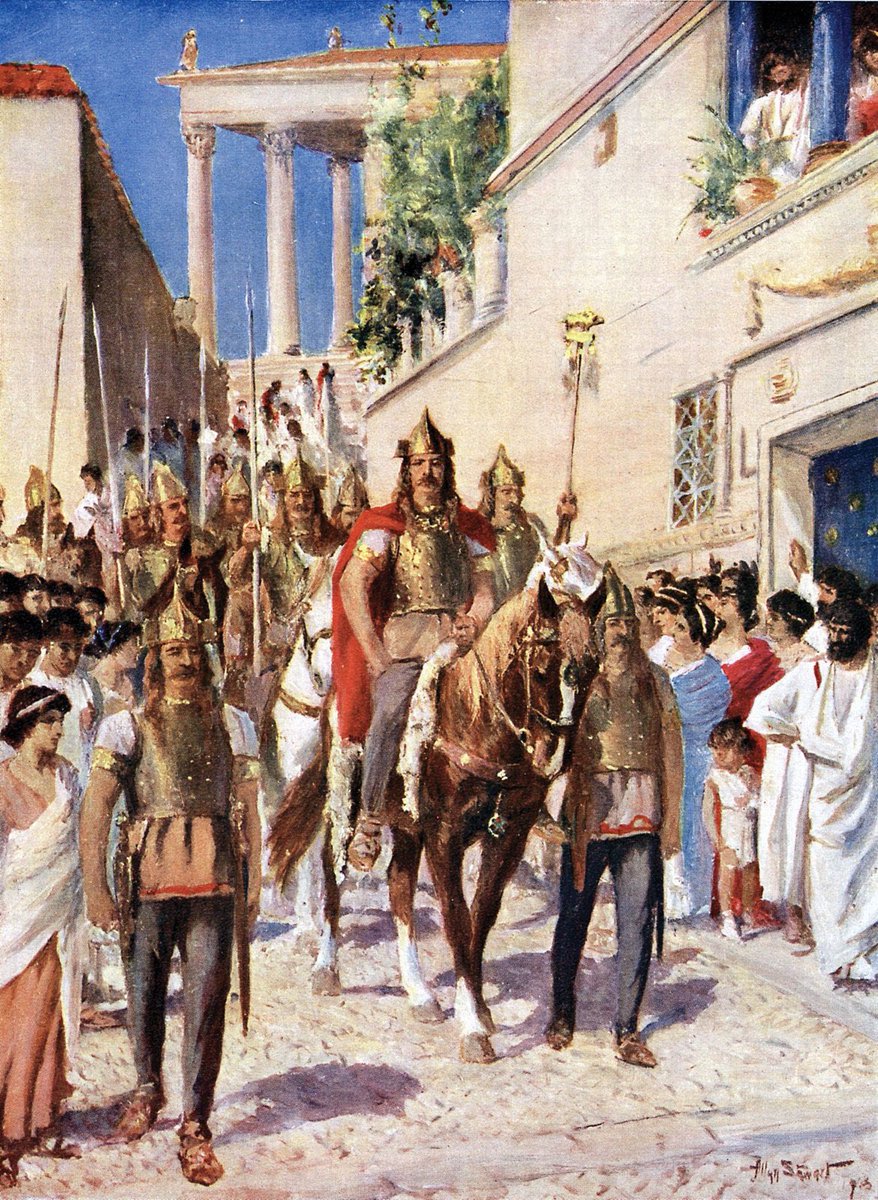
Recently, the liberal historian Douglas Boin has provided the latest instance of molding Alaric into a political weapon, with his book “Alaric the Goth.”
Here, Boin characterizes Alaric as a “refugee” tangling with “border control” and “xenophobia.
Utterly ridiculous.
Here, Boin characterizes Alaric as a “refugee” tangling with “border control” and “xenophobia.
Utterly ridiculous.

I do believe that Alaric’s story is applicable today — but that is complete nonsense.
“Alaric sacked Rome, so we must give everything we have to infinite migrants or else it’ll happen to us.”
Weak, dishonest scholarship.


“Alaric sacked Rome, so we must give everything we have to infinite migrants or else it’ll happen to us.”
Weak, dishonest scholarship.


So, for a better look at this pivotal event, a short review of Alaric’s rise to power is in order.
Alaric was born around 370 AD, on Peuce Island.
Little is known about his early life, or even his rise to Roman military leadership. All we know is that it was *fast*.
Alaric was born around 370 AD, on Peuce Island.
Little is known about his early life, or even his rise to Roman military leadership. All we know is that it was *fast*.
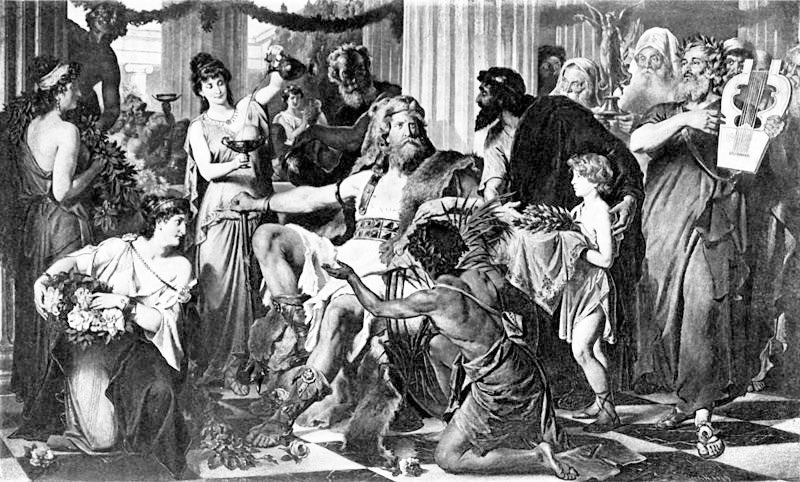
He entered Roman military service in 392 AD, and by 394 was in command of an impressive Gothic force.
Jordanes ascribes this to Alaric’s noble blood, of the Thervingian Balti dynasty.
Whether or not this is true, he clearly distinguished himself in matters of war.
Jordanes ascribes this to Alaric’s noble blood, of the Thervingian Balti dynasty.
Whether or not this is true, he clearly distinguished himself in matters of war.

It is important to note that at this time, Alaric was only ~25 years old.
He had grown up in a time of tense Roman-Gothic relations, in which the Goths were quasi-independent but still relied on Rome, supplying her with soldiers and slaves.
He had grown up in a time of tense Roman-Gothic relations, in which the Goths were quasi-independent but still relied on Rome, supplying her with soldiers and slaves.

As a young and promising commander, Alaric sought power within the Roman system by distinguishing himself on the battlefield.
In late 394, his first major opportunity came — in service of Theodosius against the Western usurper Eugenius and the Frankish general Abrogast.
In late 394, his first major opportunity came — in service of Theodosius against the Western usurper Eugenius and the Frankish general Abrogast.

This conflict would explode at the Battle of Frigidus.
There, Alaric’s Gothic auxiliaries fought as the vanguard, in what amounted to human wave tactics.
Theodosius achieved victory — but as the smoke cleared, 10,000 Goths lay dead, seen by many Romans as a victory in itself.
There, Alaric’s Gothic auxiliaries fought as the vanguard, in what amounted to human wave tactics.
Theodosius achieved victory — but as the smoke cleared, 10,000 Goths lay dead, seen by many Romans as a victory in itself.
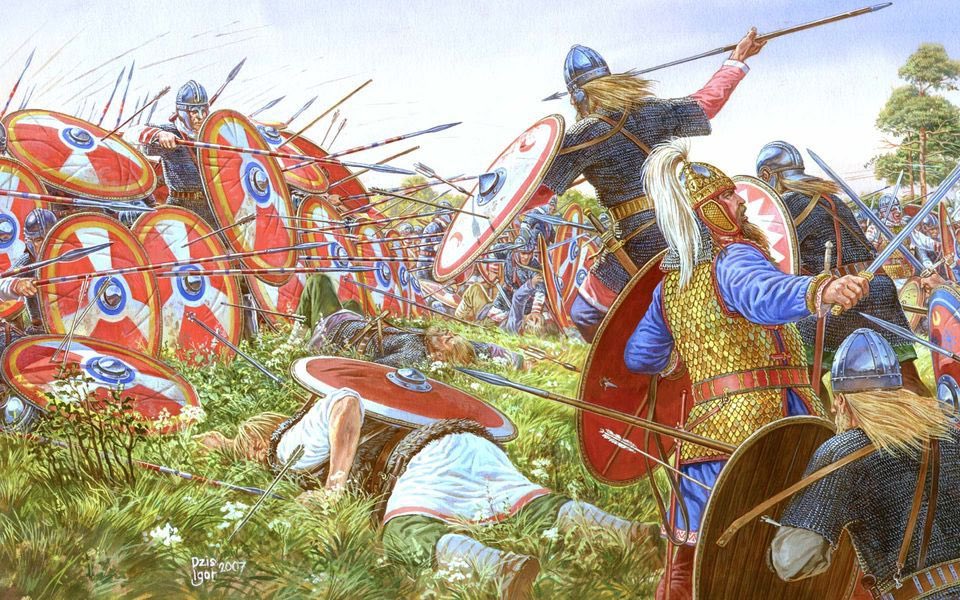
After this major victory and decimation of his men, Alaric expected — or perhaps had been promised — recognition:
The title of magister militum.
But Theodosius did not reward or even recognize the young Gothic general.


The title of magister militum.
But Theodosius did not reward or even recognize the young Gothic general.

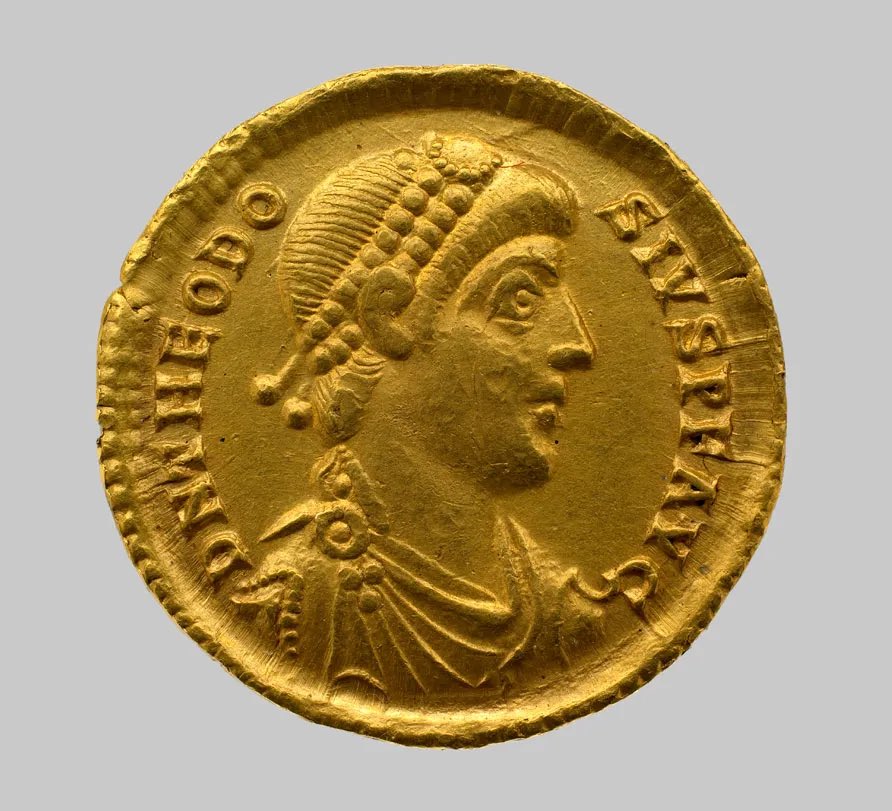
Alaric and his men felt spurned by Rome; they had spilled vast amounts of blood for no reward.
So, in the aftermath of Frigidus, the Gothic rebellion began.
Jordanes describes the moment:
So, in the aftermath of Frigidus, the Gothic rebellion began.
Jordanes describes the moment:
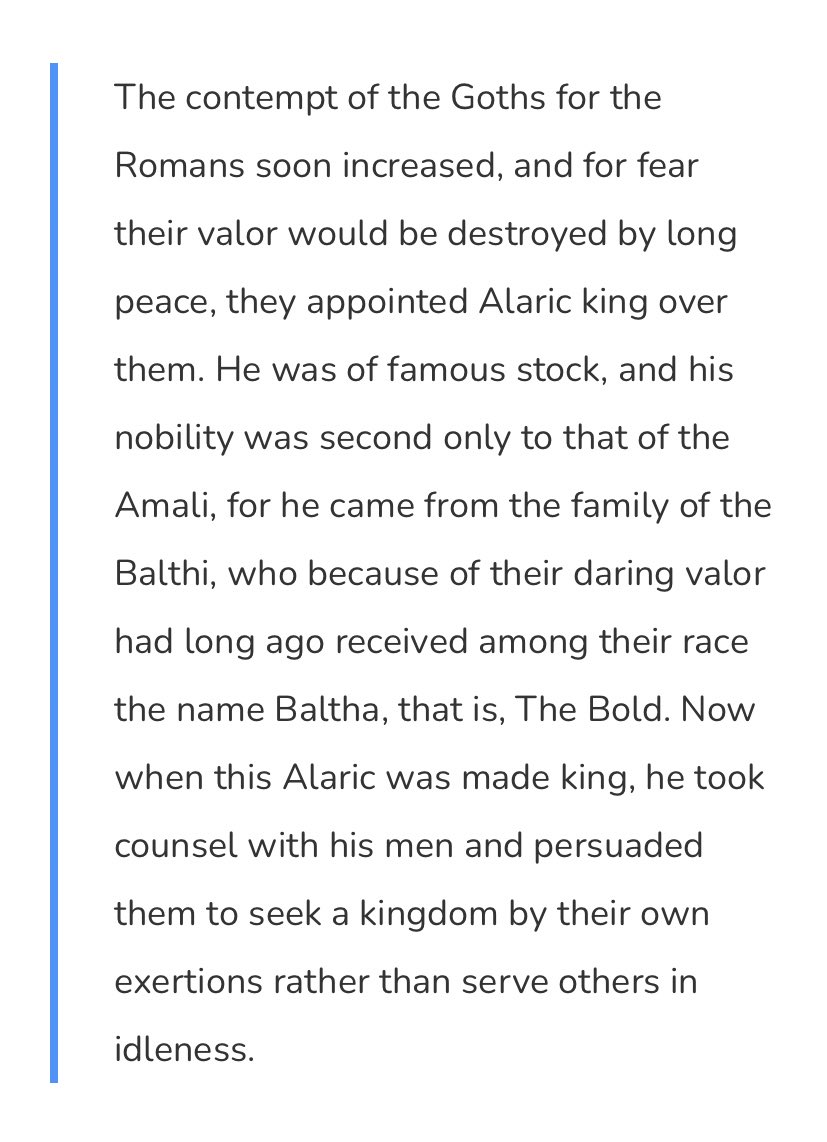
What followed was, in essence, a protracted insurgency against Rome.
Over and over, Alaric postured militarily and then engaged in good-faith negotiations, only to be betrayed and scorned… again and again.
Over and over, Alaric postured militarily and then engaged in good-faith negotiations, only to be betrayed and scorned… again and again.

The eventual sack of Rome in 410 was thus an expression of new, piratical norms —
The key moment in Visigothic history in which they realized that no legitimacy would come
from Rome; that they would have to take it themselves.
The key moment in Visigothic history in which they realized that no legitimacy would come
from Rome; that they would have to take it themselves.

The full story is too complex and nuanced for an 𝕏 thread — but here’s my full article on the subject, available via Arktos:
arktos.com/2023/10/17/kin…
arktos.com/2023/10/17/kin…
My piece on Alaric is also featured in The Dissident Review Volume III, alongside 10 other excellent essays.
The Dissident Review Vol. III: Great Men a.co/d/8chvSVT
The Dissident Review Vol. III: Great Men a.co/d/8chvSVT
I’ll close this thread with the final piece of my essay.
Alaric’s story is certainly important today — I chose his name as my pseudonym for a reason.
Hopefully this piece brings a better interpretation to light.
Alaric’s story is certainly important today — I chose his name as my pseudonym for a reason.
Hopefully this piece brings a better interpretation to light.
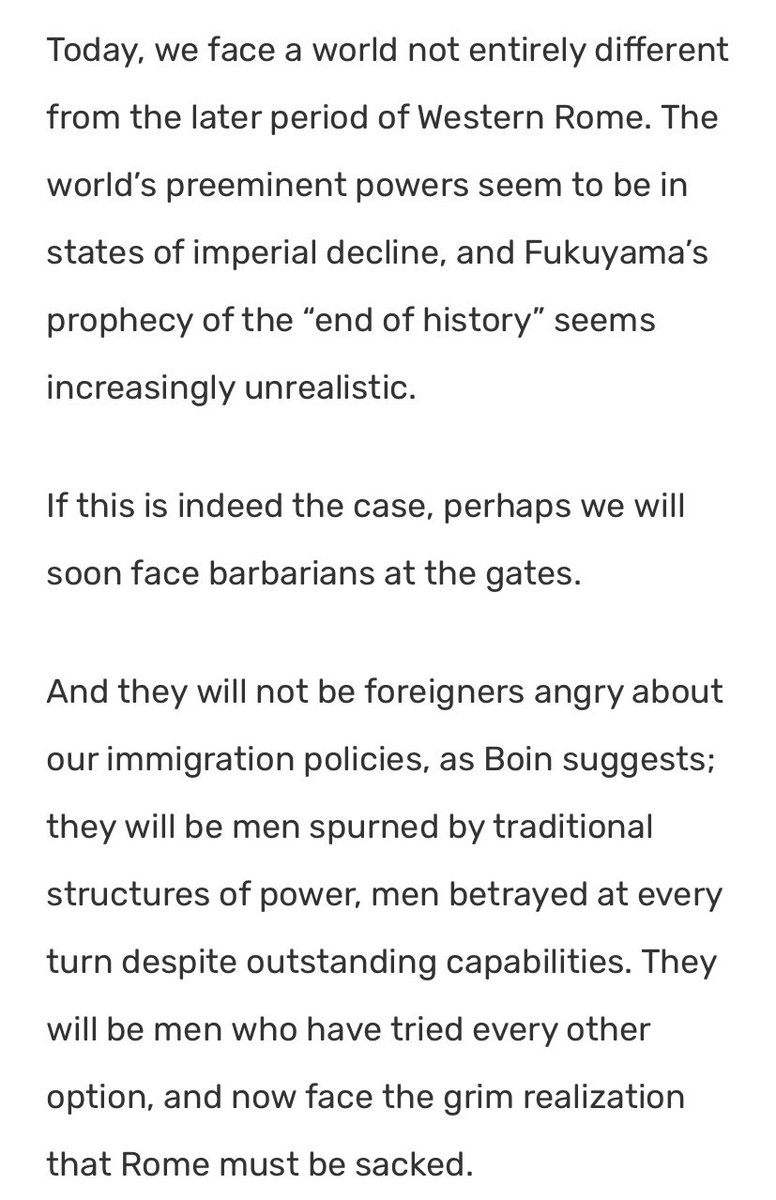
• • •
Missing some Tweet in this thread? You can try to
force a refresh











